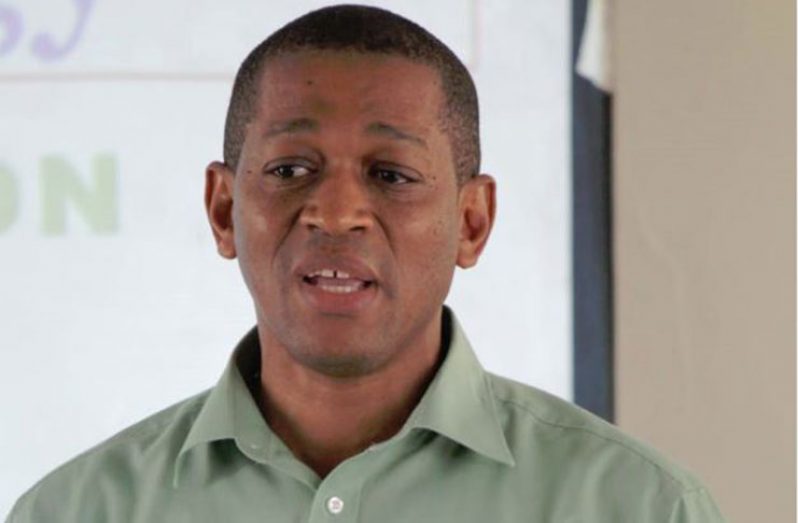– Director of Energy encourages young people to become job ready
OVER 1000 Guyanese have been employed in the Oil and Gas Sector so far, according to Director of the Department of Energy, Dr. Mark Bynoe, who encouraged youth from the National Youth Corps to become trained in competencies that will get them employed.
“Already, over 1000 people have been employed directly in the oil and gas sector” Dr. Bynoe told the gathering of young people at the Kuru Kuru Training Centre on the Soesdyke-Linden Highway on Tuesday.
Currently, he explained that this figure accounts for about 54 per cent of the persons directly employed in the oil and gas sector and, by 2020, the Department aims to have that number increased to 75 per cent. In 2017, the figure stood at less than 500 persons.
Recently, 25 Guyanese were recruited to work on the Floating Production Storage and Offloading (FPSO) vessel, which would have about 100 to 150 persons on board. An FPSO is basically a floating vessel that stores barrels of oil and is expected to meet Guyana’s shores later this year. Dr. Bynoe also disclosed that another 25 persons are set to receive training to work on the FPSO.
The Director, however, noted that in the initial stages of the development of the industry, the number of locals employed directly will not be as high.
“If we had the choice, we would employ Guyanese first [but] because it’s a new industry we first have to build up that capability and to build up that capability you first have to have training,” he explained.

In the meantime, he also highlighted that the department is encouraging “joint ventures”, which means that Guyanese work with people who have worked in this industry before, to learn and garner skills of their own.
“By working with them, over time, we can become people of our own destiny,” he affirmed.
With this in mind, he urged the gathering of young people to “train in competencies” that will get them employed both in the oil and gas sector and the jobs that will result from the transformation of Guyana.
“Oil and gas is not just about oil and gas,” Bynoe said. According to him, Guyana has need for multiple things such as better infrastructure, better educational and health services and improved access to freshwater, to name a few.
He also indicated that, through the development of the petroleum sector, there will be a rise in demand for services in all other sectors- especially in hospitality.
“There will come a time when oil and gas will be no more,” he explained and noted that as such, the government intends on using oil revenues to fund the development of more sustainable industries.
“What we should be aspiring for is those resources (from the oil and gas industry) to put us on a sustainable and continuing developmental path,” he said too, while adding that this can only be done if the young people of the country equip and position themselves.
“To be able to stay relevant, you have to keep training and learning… It is vital for succession planning and guys are the future for this country,” Bynoe said.
Chairman of Council for Technical and Vocational Education and Training (TVET), Floyd Scott, also shared with the gathering that, whatever competencies they do decide to train in, the young people should ensure that they maximise their talents and be certified.
“Every training that you are doing to take you forward, make sure that there is an alignment for you to make yourself national and international,” he stressed.
“Let it not just be exclusively for oil and gas because Guyana will have need for your skills beyond oil and gas,” Bynoe also posited.
In Guyana’s Stabroek block alone, there have been, so far, 12 discoveries which are expected to yield in excess of 5.5B barrels of recoverable oil. This newspaper reported, in March, that Guyana has raked in over US$75 million in 2018, directly from local content in the oil and gas sector. And this figure excludes downstream impacts of the industry such as works in mechanics, electrical work, welding and technical warehousing, among others.




.png)









